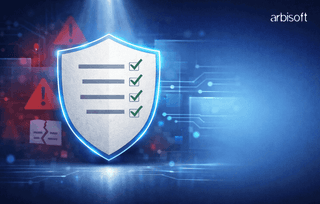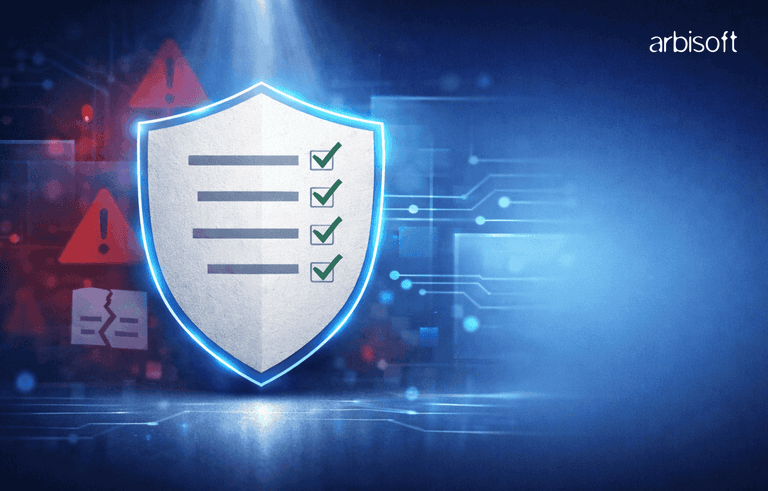We put excellence, value and quality above all - and it shows




A Technology Partnership That Goes Beyond Code

“Arbisoft has been my most trusted technology partner for now over 15 years. Arbisoft has very unique methods of recruiting and training, and the results demonstrate that. They have great teams, great positive attitudes and great communication.”
Software Quality Assurance: How AI Tools Drive Efficiency, Accuracy, and Reliability

A tiny typo in your code or a seemingly insignificant glitch can bring down an entire e-commerce platform during its biggest sale of the year.
The cost? Millions in lost revenue, damaged reputation, and a very stressed-out IT team.
Software bugs cost businesses billions every year. A 2023 report by the Consortium for Information & Software Quality (CISQ) estimated that the cost of poor-quality software in the US alone reached $2.41 trillion. Trillion! And while that number represents a broad spectrum of quality issues, bugs are a big part of it. When we talk about software QA, we're talking about real money, real impact.
Software Quality Assurance (SQA) is the process of making sure our software works as expected and delivers a great user experience. In today's world, where everything from our toasters to our transportation is software-driven, SQA is very important. But, traditional SQA methods are struggling to keep up. They're often slow, expensive, and prone to human error.
AI is changing the game for SQA, offering a smarter, more efficient way to test and ensure software quality. Forget tedious manual testing and endless bug hunts. AI-powered tools are automating everything from test case generation to defect prediction.
This blog will explore how AI is improving SQA. We'll see the specific ways AI is being used, the benefits it offers, and what the future holds for AI in software testing.
AI Can Cut Your Testing Time by 80%! Discover the best AI tools for software testing.

Supercharge Your QA with AI!

The Challenges of Traditional SQA
In a lot of cases, traditional software quality assurance can be a real drag. Imagine spending hours clicking through every possible scenario in your application, hoping to catch that one sneaky bug. That's manual testing in a nutshell. It's time-consuming, repetitive, and, let's be honest, pretty boring. And the worst part? Humans make mistakes. We get tired, we overlook things, and sometimes, those critical bugs slip through the cracks.
Manual testing also struggles with scale. Think about the sheer volume of data many applications handle today. And what about the complexity of modern software? We're talking microservices, cloud-native apps, mobile platforms, IoT devices – the list goes on. These complex systems are incredibly difficult to test comprehensively with traditional methods.
Now, throw in the pressure to release software faster. Agile and DevOps methodologies demand rapid development cycles, which puts immense strain on traditional QA. How can you possibly keep up with the pace of development when your testing processes are slow and manual? You can't. Something has to give more.
And let's not forget the end-users. They expect seamless, high-quality experiences. They don't care about your development challenges - they just want software that works flawlessly. A buggy app is a recipe for disaster. Users will simply switch to a competitor.
So, where does this leave us? Traditional SQA is struggling to keep pace with the demands of modern software development. It's slow, error-prone, and can't handle the complexity and scale of today's applications. That's why we need AI. AI offers the potential to overcome the limitations of traditional testing and deliver the speed, accuracy, and reliability we need today.
How AI is Transforming SQA - The "What" and "How"
So, how is AI changing the SQA game? It's not just about bots replacing testers (not yet, anyway!). It's about smart tools that supercharge the entire testing process.
- AI-Powered Test Automation - Smart test scripts that adapt and generate tests automatically. AI-driven test automation tools, such as Selenium with AI enhancements, Test.ai, and Applitools, are reducing test execution times by up to 80%.
- Predictive Analytics for Defect Detection - AI predicts bugs before they happen, enabling proactive fixes. AI enables better resource allocation and test case prioritizing by pointing out high-risk areas.
- AI-Enhanced Test Data Management - AI creates realistic test data, helping with data shortages and privacy concerns. This is useful in healthcare and finance, where real user data is hard to access due to strict rules.
- AI for Performance Testing - AI automates speed tests by finding bottlenecks and guessing how the system will act. It simulates real user loads and finds issues early. This allows a smooth and responsive experience.
- AI-Driven Visual Testing - Visual UI bugs are found instantly by AI, which makes sure that the user experience is smooth. Tools like Applitools Eyes use AI to detect visual discrepancies in user interfaces, ensuring a polished and consistent user experience. This helps catch those subtle UI glitches that can negatively impact user perception.
- Natural Language Processing (NLP) for Bug Reporting and Analysis - AI analyzes and prioritizes bug reports, improving efficiency. NLP can categorize bug reports, identify duplicate reports, and even predict the severity of a bug, helping teams focus on the most critical issues first. This can reduce the time spent managing and triaging bug reports.
Market Trends and Industry Adoption
The buzz around AI in SQA isn't just hype. It's a full-blown revolution. Let's look at where the market's headed.
1. Surge in AI Adoption for SQA
AI is becoming a key component of software testing. Recent studies reveal that 80% of software teams are now utilizing AI tools to enhance their testing processes. This widespread adoption has led to a notable reduction in software defects, with major enterprises reporting a 40% decrease in issues due to AI-driven testing tools.
2. Embracing Continuous Testing and DevOps Integration
The fusion of AI with Continuous Integration/Continuous Deployment (CI/CD) pipelines is improving software delivery. DevOps teams that use AI-enhanced quality assurance have achieved software release cycles that are 30% faster, streamlining the path from development to deployment.
3. Rise of Autonomous Testing Frameworks
AI-powered autonomous testing frameworks are now capable of handling 85% of repetitive test cases. They can reduce the need for manual intervention. These self-learning systems not only save time by automating repetitive tasks but also improve test efficacy.
Challenges and Considerations in AI-Driven QA
While AI is making software testing faster and smarter, it comes with its own challenges. Here are a few things to keep in mind.
1. Data Quality and Bias
AI relies on good data to make accurate decisions. If the data is incomplete or biased, AI can produce unreliable results. For instance, AI test automation tools trained on limited datasets may miss critical bugs in diverse real-world scenarios. In 2025, companies are investing more in better data collection and management to avoid these issues.
2. High Initial Costs
AI-powered testing tools can be expensive to set up. They require advanced infrastructure and skilled professionals, which adds to the cost. However, research shows that businesses using AI in testing save up to 30% in testing time and reduce defects by 40%, making the investment worth it in the long run.
3. Skill Gaps in QA Teams
Traditional QA teams are used to manual and scripted testing, but AI-based testing requires knowledge of machine learning, automation, and analytics. In 2025, over 60% of software testing professionals will need AI training to stay relevant. Many companies are now offering AI-focused training programs to upskill their teams.
Parting Thoughts
AI is making a lot of waves in software quality assurance today. From automating repetitive tests to predicting defects before they happen, AI is making software testing faster, smarter, and more reliable. Companies using AI-driven testing have seen up to 40% fewer defects and 30% faster release cycles—clear proof that AI is bringing good change in the industry.
If you're still relying only on traditional testing methods, now is the time to rethink your strategy. AI-powered tools reduce manual effort, enhance test coverage, and speed up deployment, giving your team more time to focus on innovation.
As AI keeps evolving, its role in software development will only grow. The companies that adapt early will stay ahead of the curve. Investing in AI-driven testing today means better software, fewer bugs, and happier users tomorrow.
























